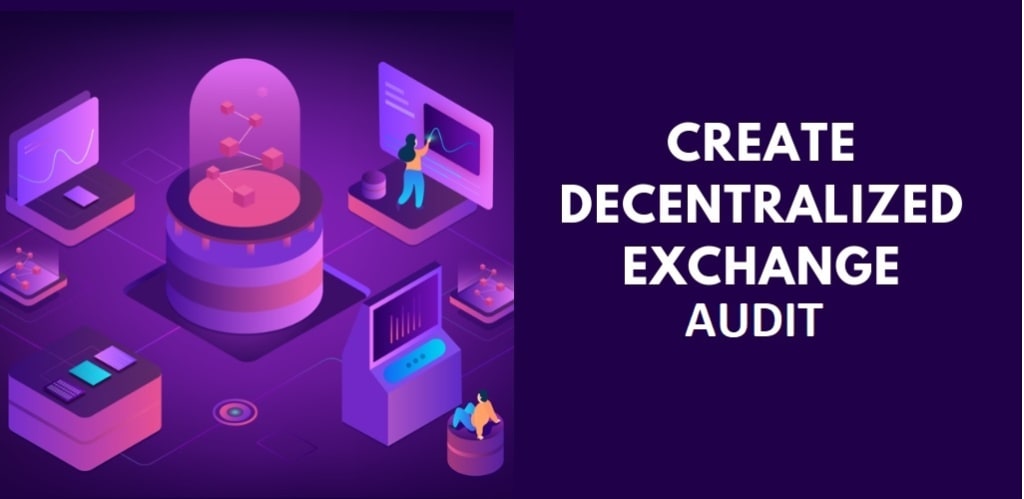Will a DEX audit pave the way for less severe cryptocurrency hacks?
Decentralized Exchange Audit Services

What is DEX?
A decentralised exchange (DEX), as its name indicates, lacks a central authority. It is a peer-to-peer exchange that enables users to trade cryptocurrencies without the need for a middleman to handle the transaction and the money.
To facilitate the exchange of assets, DEXs utilise blockchain-based smart contracts in place of conventional middlemen like banks, brokers, payment processors, and other companies.
A crucial component of Decentralized Exchange Audit Services finance is DEXs (DeFi). DEXs provide total transparency into the flow of funds and every mechanism involved in supporting the exchange. The hazards associated with centralization within the cryptocurrency ecosystem are removed since user money do not flow via the crypto wallet of any third party. This improves the cybersecurity of DEX. Due of its capacity to compile without authorization, DEXs are a key “money LEGO” upon which more complex financial products can be built.
What is the Operation of a Decentralized Exchange (DEX)?
Users can keep their money in smart contracts on blockchains. A transaction charge and a trading fee must be paid by the user. On top of these networks, these decentralised exchanges (DEX) are constructed. To utilise DEX, traders communicate using smart contracts.
The benefits of decentralisation, feature sets, and scalability are different in each DEX architecture.
Both the network and trading fees must be paid by users. Network fees refer to the gas expense of the on-chain transaction, whereas trading fees are collected by the underlying protocol, its liquidity providers, token holders, or a combination of these organizations, as stated by the protocol’s design.
The protocol is administered by a decentralised autonomous organisation (DAO), which is comprised of all the community’s stakeholders. These exchanges’ main goal is to create an end-to-end on-chain infrastructure that is permissionless accessible, has decentralised ownership among a number of stakeholders, has no single point of failure, and is end-to-end.
Let’s now talk about the various kinds of decentralised exchanges (DEX).
Types of Decentralized Exchanges (DEX)
You can come across three main types of decentralized exchanges which are as follows:
Automated Market Makers (AMM)
This solution is predicated on the idea that a smart contract’s main function is to address the liquidity issue. These AMMs collect information from exchanges and other platforms and use blockchain-based services known as blockchain oracles to calculate the price of traded assets. Instead of matching buy and sell orders, the smart contracts of these decentralised exchanges use pre-funded pools of assets known as liquidity pools.
Order book DEXs
Order books record all active buy and sell orders for certain asset pairs. Buy orders indicate a trader’s eagerness to purchase or make a bid for an asset at that price, whereas sell orders indicate a trader’s willingness to ask for a special price to sell an asset. The difference between these values determines the size of the order book and the market price on the exchange. Decentralized Exchange Auditing company
The open order information is usually stored on-chain when DEXs employ order books, while user money are retained in their wallets. These exchanges could allow users to leverage their bets by using funds provided to them by lenders on the site. Leveraged trading increases a trade’s potential for profit but also increases the risk of liquidation because it increases the position size with borrowed funds that must be repaid even if the traders lose their wager.
DEX systems, which retain their order books off the blockchain, only settle deals there in order to provide traders the benefits of centralised exchanges. Off-chain order books help exchanges run more efficiently while assuring that deals are executed at prices that customers wish to pay.
It is important to remember that order book DEXs typically have liquidity issues. Because they effectively compete with centralised exchanges and suffer additional fees because to what is paid to transact on-chain, traders often stick to centralised platforms. These costs are reduced by DEXs with off-chain order books, but there are risks with smart contracts since funds must be placed in them.
DEX aggregators
DEX aggregators employ a variety of mechanisms and protocols to address the liquidity-related problems. These platforms essentially pool liquidity from numerous DEXs to reduce slippage on large orders, optimise swap fees and token prices, and give traders the lowest price in the shortest amount of time.
How does DEX work?
For DEX, there is no registration procedure. As a trader, you must have a wallet that is compatible with the smart contracts on the exchange network. You can easily access the financial services offered by the decentralised exchanges if you have a smartphone and an internet connection.
These are the procedures you must adhere to in order to use a DEX
- Decide the network that you want to use.
- Choose a wallet that is compatible with the network that you have selected.
- Fund it with its native token to pay the transaction fees.
- Buy the tokens on centralized exchanges.
- Withdraw the tokens to their wallets.
- Click the “Connect Wallet” on the website of DEX.
Pros of using a Decentralized Exchange
It is expensive to trade on DEXs, especially if the transaction fees on the network are high. Nevertheless, who doesn’t like the idea of secure DEX crypto? The list of advantages of using a DEX is as follows:
Token availability
Unlike Decentralized Exchange Audit Service Provider, DEXs have the advantage of including any token minted on the blockchain. This means that all the new projects are likely to get listed on them way before getting listed on CEXs.
Anonymity
On DEX, users may exchange one cryptocurrency for another while maintaining their privacy. Users do not have to undergo KYC procedures in DEX, in contrast to CEX. As a result, DEXs draw a lot of individuals who do not want their identities to be made public.
Drawbacks of utilising a DEX
Using a DEX has certain disadvantages in addition to the benefits described above. These are listed below:
Technical expertise needed
Only cryptocurrency wallets that can communicate with smart contracts may access DEXs. Users must thus understand how to utilise digital wallets and the ideas relating to the security of the funds.
When traders have comprehensive technical understanding about withdrawing coins to the appropriate network, they may go to numerous locations without risking losing their money.
The Conclusion
Even if centralised exchanges continue to dominate the cryptocurrency industry and satisfy the needs of everyday investors and dealers, decentralised exchanges provide an exciting alternative.
DEXs offer fresh examples of fair participation and governance for all stakeholders by linking buyers and sellers without requiring the confidence of a third party. DEX Audit services is extremely significant to users.
The user experience, infrastructure, scalability methods, and more linkages to centralised crypto all require some upgrades. Since DEX is unquestionably the exchange of the future, DEX audit will be crucial in reducing cryptocurrency hacks.
About the Creator
cypher shield
Get your smart contracts audited and certified by leading smart contract security experts. Our smart contract audit services cover functionality, vulnerabilities, and gas efficiency. Talk to a consultant now to get started.






Comments
There are no comments for this story
Be the first to respond and start the conversation.